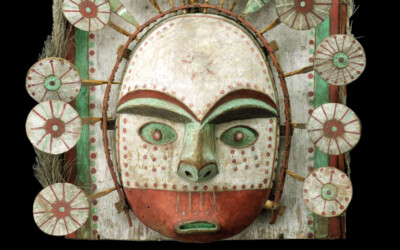MICHAEL HARNER
1929-2018
Michael Harner began his personal journey into shamanism in 1956-57 working as an anthropologist among the Shuar (Jívaro) and Conibo peoples of the Amazon. In time he became recognized as a shaman by many indigenous people in North and South America, the Arctic, and central Asia. His anthropological studies and personal experiences of numerous shamanic traditions inspired him to develop “core shamanism,” a way to practice basic shamanic skills that are universally found around the world. In 1987 he left academia to teach core shamanism to Westerners, which led to his creating the Foundation for Shamanic Studies (www.shamanism.org), an organization of teachers who have trained with him and which, today, teaches shamanic practices worldwide. It can be honestly said that Michael’s work brought shamanism to tens of thousands of people and preserved shamanic traditions of many indigenous peoples.
—The Editors
I don’t think there is a western shamanic practitioner that is untouched by Michael Harner’s legacy. If you were born into western culture and use the drum to journey with, you’ve been touched by Harner’s influence. It’s that simple and wide ranging.
Of course Michael Harner didn’t invent drumming and shamanic journeying, but he opened a great swath of western culture to them by making the techniques easily accessible to people completely ignorant of shamanic traditions and practices because of the culture they were born into. He re-opened a door to our humanness (and supra-humanness) that had been slammed shut on us many generations ago.
For me, it’s crucial to understand that Harner’s immense effect came about by him doing what he was not supposed to do. Anthropologists of his time were trained to stand aside and observe. One of the worst things was lose their scientific perspective, their objective distance – otherwise known to me as western arrogance. Harner realized that we (people of the slammed-shut door) would never understand indigenous practice, thought or heart by standing aside taking notes. Leaving the intellectual prison is the only way to approach shamanic work.
This is a lesson I summon whenever I am afraid of this work – when an inner voice tells me to afraid that it will make me crazy and unemployable, afraid that I’ll lose family and friends as I become increasingly bizarre, afraid when people who don’t know my heart try to make me feel ashamed of doing shamanic work and tell me to stop, or tell me I’m doing it wrong.
There are many ways to criticize the huge effect Michael Harner had on American culture by opening that door to accessible, easy-to-learn practices that humans across the earth have done since shortly after standing on two legs (except for those of the slammed-shut door). The critiques levelled against Harner’s teachings are the same as those aimed at yoga and meditation – that the practices cannot be separated from their cultural source, that we thin them out and make them superficial. Well, we certainly can do that to anything, yes. We are a culture reeling from spiritual sickness and we can be clumsy as we try to regain our balance. But the way I see it, it was not Michael Harner who re-opened the old door for us; it was Spirit bringing medicine to a people who desperately needed it. So, I say:
Keep playing your drum calling, calling
For now Spirit has touched something in your spirit body
And now you are awake and free
You have become that old sky creature
Circling, circling for one more kiss of sunlight.
—Jaime Meyer
The most striking thing about this man was his humility. In spite of his vast knowledge and wisdom based on experience, he in many ways was just a regular guy. I read his book The Shaman’s Way in the mid-90’s and was feeling the call to follow this new path. A weekend introductory course in 1995 was all it took, and from there I trained in other approaches to shamanic training including the Foundation for Shamanic Studies Three Year program. Michael not only provided strong leadership but also facilitated experiences that deepened my shamanic practice to the point where I quit my psychotherapy practice and transitioned to doing shamanic healing. He was a great man and has left a living legacy with all he has touched. Now a spiritual ancestor I call on from time to time to give thanks.
—Steven Farmer
Once, after I had been studying with Michael for a good number of years, I found myself in a conversation with people who were not students of Michael. It was a conversation about those endlessly fascinating, endlessly frustrating Big Questions: What is the meaning of life? Where did we come from? Where are we going? Why is there evil? What happens after death?
One of the people in the conversation said to me, “Harner is your teacher. How does he answer these questions?” Instantly I realized that I didn’t know, and I felt somewhat embarrassed to have to say, “I have no idea.” But also, instantly, I realized why I didn’t know: Michael was not a guru, and never wanted to be a guru, and so he never gave us answers to these fundamentally religious questions.
Michael never presented shamanism as a religion or as a one-way path to one-only Truth. He was very clear that this is not what he was teaching. What I have always admired about him is that he gave us basic shamanic tools, created from his vast knowledge of many indigenous traditions, and taught us skills so that we could discover for ourselves the answers to the Big Questions in life. The fact that after many years I had no idea how Michael would answer these questions was a poignant testimony to how clear he was about who he was and what he was teaching.
Trained as an anthropologist by the Western world and by shamans in the indigenous worlds, Michael was a perfect walker-between-the-worlds for people like us. He was the right man at the right time in the right place to introduce shamanic wisdom to the West. I feel incredibly fortunate to have discovered Michael when I was searching for a trustworthy framework for my wandering searches for a meaningful spiritual life. And what he taught me was truly meaningful. He trusted us to take what he taught, and run with it, discovering our own truths and meanings from a direct and personal connection with the sources of wisdom. No, Michael did not tell us the meaning of life. He simply showed us our “long winged feathers” and how to fly.
—Tom Cowan
I had the privilege of meeting Michael Harner in 1980 when he was a faculty member at CIIS (California Institute of Integral Studies) in San Francisco. At the time it was named the California Institute of Asian Studies. I was enrolled there as a doctoral student in counseling Psychology and took his series of workshops on Shamanism where he taught the basics of shamanism and the Journey method he had learned from the Northwest Coast Salish tribe and other shamanic indigenous peoples across the globe. I recall these as some of the most interesting and entertaining classes during my three years there. Michael was funny, well informed, and a charismatic teacher and I liked his informality as an instructor. It was during these workshops that I also met Sandra Ingerman who was also studying there and who was to work closely with Michael for many years afterwards.
My choice of a dissertation topic comparing western and shamanic influences in people’s mental health was heavily influenced by what I had learned from Michael in his classes. I asked him to be on my dissertation committee and he graciously agreed. After graduating I weighed the possibility of working with Michael as he began to put together his Center for Shamanic Studies back in Connecticut but when an opportunity to apprentice with Guadalupe C., a renowned Huichol Maracame, the choice was made. I had a different destiny. Since our paths lead in different directions I saw very little of Michael after graduate school. Over the years I watched as Michael’s fame and influence grew as the chief purveyor of shamanic information in the United States and Europe and I was very impressed with what he was accomplishing. There is no question that Michael played a very significant role in stimulating the interest in shamanic ways among thousands of people during the years leading up to his passing.
Later I was to work with a very accomplished astrologer who told me about an in-depth study by several prominent astrologers as to what the most significant discovery of the late twentieth and early twenty-first century was. Their conclusion was undoubtedly the integration of shamanic tradition with quantum physics and modern science. That is still playing out and it is quite clear that Michael had a prominent role to play in this powerful drama.
—Jose Luis Stevens Ph.D.
Through core shamanism Michael made shamanism accessible to those of us called to its practice without a clear connection to our cultural roots. It was his initial work that led me to my own practice of shamanism and ultimately to establishing the Society for Shamanic Practitioners. Without his vision many of us would have had many more hurdles to cross answering our hearts’ desire to work in this way. His presence is missed, but his work still supports many on the shamanic path.
—Alan Davis, MD, PhD





0 Comments